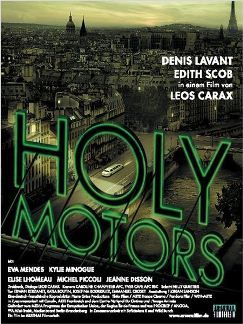
Recently I wrote about Holy Motors and, because it was part of this year’s 50th Anniversary New York Film Festival, I’d hoped to write about the movie and the surrounding happenings, namely the q & a with director Leos Carax. But, due to the enormous intrigue around the film itself, a work I felt I could go on and on about while still only touching the surface,I found it more manageable to write about the film and the exchange that followed separately.
What had stood out to me as the most salient idea is that of an individual whose life is intertwined with the world of the screen coming to grips with a disappearing cinema. Interestingly enough, one of the only two other New York Film Festival entries I watched, Berberian Sound Studio deals with the same theme. Both that film and Holy Motors offer a lament,yet the approach is very different. Berberian Sound Studio seeks to bring us back to the days of larger than life filmmaking by reconstructing a particular atmosphere along with the equipment of the time. Devices are large and intimidating, yet even as the images on screen aim to horrify, they are presented with a noticeably endearing awe. Holy Motor’s perspective is one of looking back, as Oscar, the unrelenting actor played by Denis Lavant, recalls earlier days while occupying the present one. It can be viewed as the near future, or perhaps a magic realism laced alternate present. In it cameras are all around, yet have been reduced from the grandiose machines of Berberian Sound Studio to actual invisibility.
The post-screening q & a with Carax helped me to form some of my understandings of the film. Regarding the above, the director’s words pointed to an interesting overlapping of Oscar and Carax’s standpoint. We have the film’s protagonist longing for the older conditions, yet toiling endlessly for the now diminished cameras. Then later, Carax would speak dourly on digital technology (he described it as a cure to a disease nobody is afflicted with, which nobody asked for) all the while explaining its wide use throughout shooting Holy Motors as an economical necessity. Like Oscar, cinema’s change has not reduced Carax’s passion. He is still right there in it.
Not all of Carax’s responses were as equally enlightening. At first Carax proved to be as elusive an interview subject as word of mouth has suggested. Some attempts at pinning Carax down to political or topical agendas led to amusing retorts. When asked if a scene involving a supermodel being veiled with a makeshift Burka (by Carax’s pet idiot savage, Merd) was a kind of statement on Muslim relations in France, Carax shrugged, “how should I know?” He equated explaining the thinking behind his filmmaking decisions to having a discussion after sex with one’s partner about the choice of positions and movements. Demystifying. Uncomfortable. After another audience member explicated at length the similarities between Holy Motors and David Cronenberg’s recent Cosmopolis (namely that both films show their protagonists riding in a limousine throughout most of their duration) and asked if Carax had read the novel that movie was based on, he answered with a succinct, unapologetic, “no.”
At times, though, the director seemed a bit less guarded and more revealing on the nature of his much-discussed spectacle.One idea that was put forth about the appointments that comprise the film (a series of scenes involving the main character altering his persona and engaging in situations ranging from breathtaking abstraction to eye-moistening melodrama) is that these are supposed to represent the spectrum of genres that appear before us in films . It is most likely an interpretation that many viewers will grasp at. While Carax did not dismiss the notion entirely, he insisted the collection of scenes were more intended to show the range of human experiences a man goes through in a lifetime.
Considering how well versed the director is in the language of film (Holy Motors alone providing plenty of evidence that), it seems entirely plausible that there are aspects of truth in both interpretations at the same time.
Holy Motors is still playing in theaters.
Me on twitter = @mondocurry
No comments:
Post a Comment